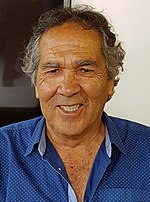About Hernán Rivera Letelier
- Hernán Rivera Letelier (born 11 July 1950 in Talca, Chile) is a Chilean novelist.
- Until the age of 11 he lived in the Algorta (Chile) saltpeter mining town.
- When it was closed down, he and his family moved to Antofagasta, where his mother died.
- His siblings went to live with his aunts.
- He stayed in Antofagasta, alone, until he was about 11.
- To survive, he sold newspapers.
- Later he worked as a messenger for Anglo Lautaro Nirate Company, until his thirst for adventure led him to spend three years traveling in Chile, Bolivia, Perú, Ecuador and Argentina.
- He returned to Antofagasta in 1973 and began to work at another company, Mantos Blancos.
- He married a 17-year-old girl when he was 24.
- Later he left for Pedro de Valdivia, another saltpeter mining town.
- He completed his seventh and eighth years of study at night school, and at the Inacap educational institute he earned his license as a secondary education instructor.
- Today he lives in Antofagasta with his wife and four children.
- He has received the Premio Consejo Nacional de Libro (Chilean National Book Award) twice, in 1994 and 1996.
- His novel El arte de la resurrección won the Premio Alfaguara de Novela in Spain in 2010.Although his early works consisted of poetry and stories (Poemas y Pomadas Cuentos breves y Cuescos de brevas), it is as a novelist that he has had the greatest success, both critical and popular.
- His books are being translated to several languages and it is possible that film versions will be made. He dreams of having a literary style which blends "the magic of Juan Rulfo, the marvels of Gabriel García Márquez, the playfulness of Cortázar, the refinement of Carlos Fuentes, and the intelligence of Borges." El arte de la resurrección is a comic love story set in the early 1940s during a strike by saltpetre miners in barren northern Chile.
- It centres on the obsession of the historical-mythical folk preacher El Cristo de Elqui (the Christ of Elqui) with making a disciple of a devout prostitute called Magalena Mercado.
Read more at Wikipedia
See Also
- Famous People's Birthdays on 11 July, Spain
- Famous People's Birthdays in July, Spain
- Famous People's Birthdays on 11 July, Chile
- Famous People's Birthdays in July, Chile
- Famous writer's Birthdays on 11 July, Spain
- Famous writer's Birthdays in July, Spain
- Famous writer's Birthdays on 11 July, Chile
- Famous writer's Birthdays in July, Chile


 Date of Birth:
Date of Birth:  Place of Birth: Linares, Andalusia, Spain
Place of Birth: Linares, Andalusia, Spain